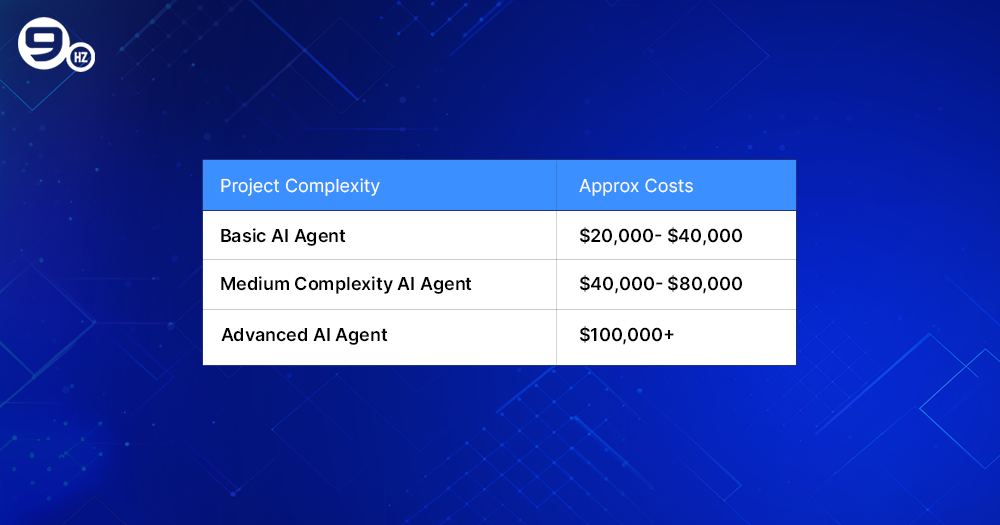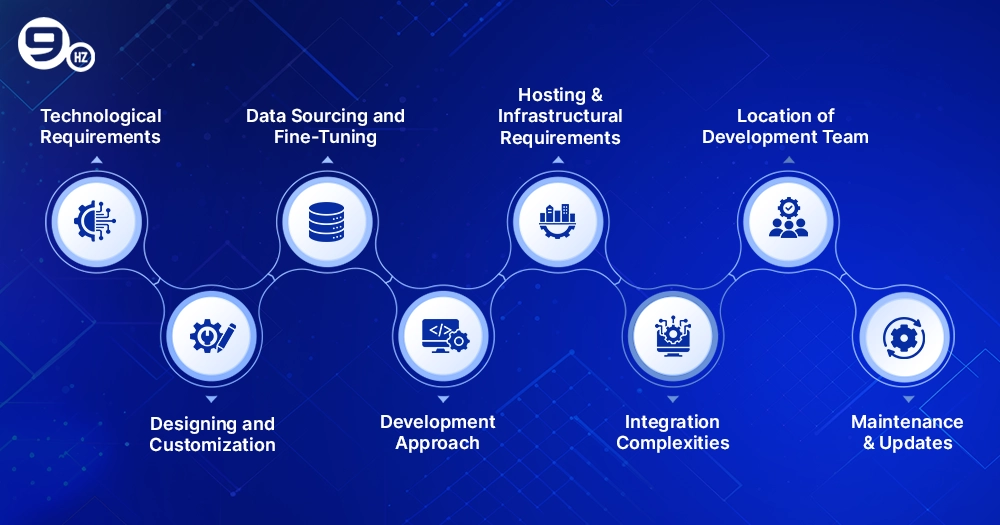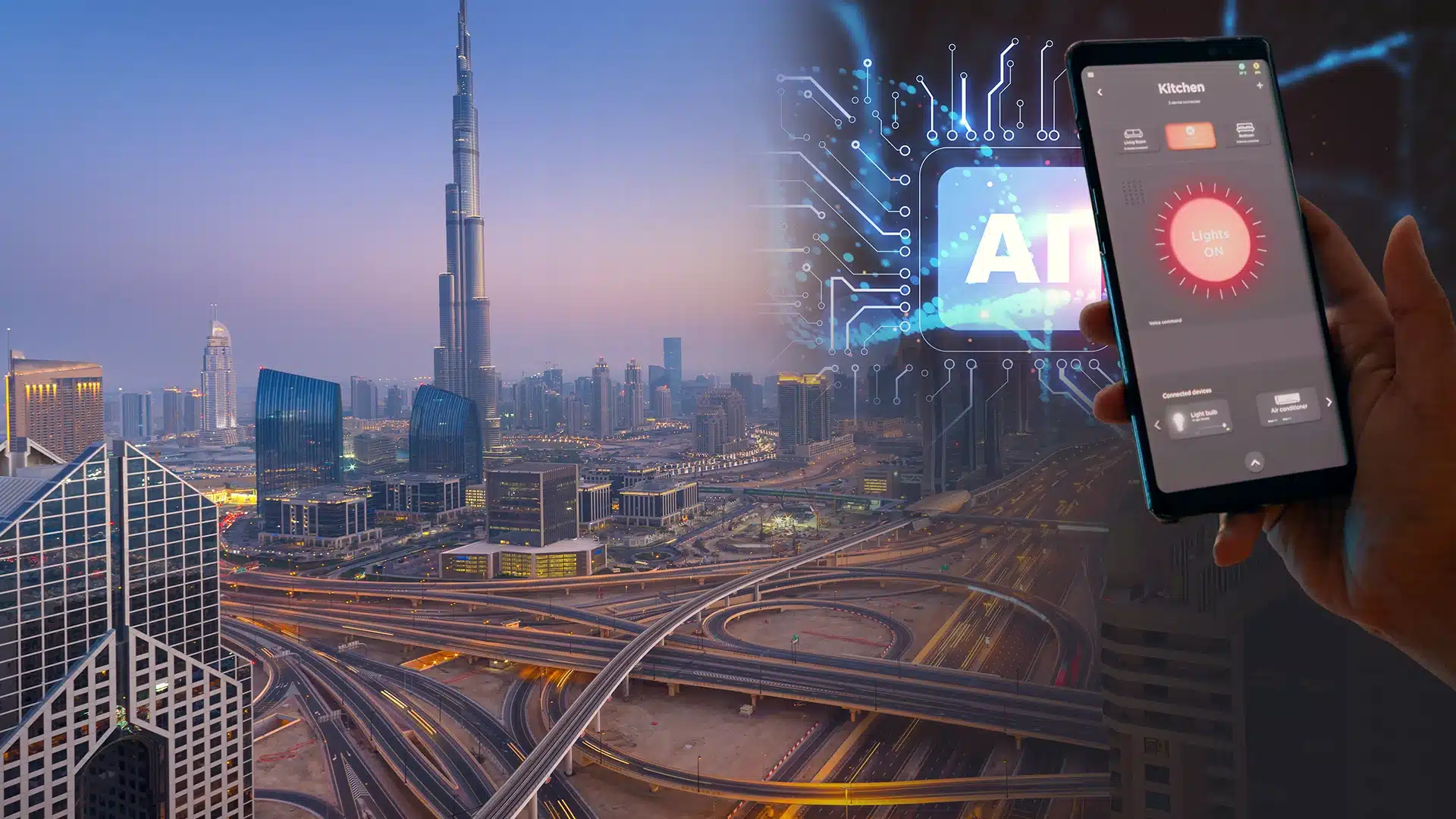Artificial intelligence has now become a concept that carries the power to redefine the future of a business. Whether it is incorporating an AI chatbot to offer a personalized customer experience or an AI agent that can automate tasks while ensuring the least human intervention and thus errors. There is no doubt that AI agents are no more an option but a future navigation strategic factor that must be incorporated into the operations. However, the AI agent development cost is something that changes the decision of most business owners.
According to Market and Market, the AI agent market is valued at $7.84 billion in 2025, which is expected to grow with a CAGR of 46.3% to achieve a valuation $52.62 billion by 2030. Generally, it costs anywhere between $40,000-$300,000 to build an AI agent; the exact amount can differ on the basis of multiple factors.
To make sure that you are not one of those misguided decision makers who are deprived of the marvellous capabilities of AI agents, we have brought to you the guide that will talk about everything about how much does it costs to create an AI agent, factors influencing the costs, and how you can control the budget without compromising the competencies.
What Is an AI Agent? Types and Use Cases Explained
First of all, it is crucial to have a basic understanding of AI agents to navigate thoughtful decision-making. AI agents are simply the software programs that incorporate advanced technological concepts like machine learning, neural networks, and natural language processing. The core purpose of these intelligent agents is the focus on automating a business task while minimizing human intervention.
There are different types of AI agents based on their working mechanisms, which include-
- AI Customer Service Agent– The simple yet highly useful autonomous AI agents that help to offer 24*7 customer assistance while enhancing performance with each interaction.
- LLM-Powered task agent- The advanced AI agent that incorporates a large language model to understand user prompts, analyze context, and focus on automating the task.
- RAG- An intelligent agent that doesn’t limit its knowledge to trained boundaries only, but also gathers data from live sources.
- Multi-agent Systems- The combination of multiple AI agents while each playing its particular role in automating the entire process.
How Much Does AI Agent Development Cost in 2025? [Full Breakdown]
Generally, it costs anywhere between $40,000-$300,000 to build a basic to advanced AI agent. However, the exact AI agent software development costs might vary significantly according to changing business needs. For instance, building a simple AI chatbot that can offer active assistance to stakeholders won’t require external data for training and thus also costs less. On the other hand, developing an enterprise-grade solution that can streamline the entire task with increased accuracy will require the incorporation of various AI subsets and thus increase the development costs.
1. AI Agent Development Cost Based On Project Complexity
The cost of AI agent development also depends on the complexity of the project. The solution with fewer complexities and single technology requirements can be developed with a lower budget. On the other hand, working on a complex project requires the support of various platforms, technologies, and human resources, which increases the AI agent development costs.
| Project Complexity | Description | Approx Costs |
|---|---|---|
| Basic AI Agent | Simple FAQ bot for websites and apps | $20,000- $40,000 |
| Medium Complexity AI Agent | Highly capable bot for human-like interaction and workflow automation | $40,000- $80,000 |
| Advanced AI Agent | Advanced solution with predictive analytics, decision making, and recommendation capabilities | $100,000+ |
Related Reading: Agentic AI vs AI Agents: 8 Key Differences You Need to Know in 2025
2. AI Agent Development Cost Based On Features & Capabilities
The number and type of features defines the AI agent use cases according to particular business needs and client preferences. However, it is important to understand that the features highly influence the development cost. Here is the AI agent development cost breakdown on the basis of features and functionalities imparted into the solution-
| Features | Description | Approx. Cost |
|---|---|---|
| Basic Chabot | The feature allows the AI agent to handle queries from users, understand the intent, and provide the relevant information from the trained dataset. | $20,000- $40,000 |
| NLP Conversational Agent | Natural language processing, when incorporated into an AI agent, allows it to learn from dynamic interactions and thus offer personalized assistance to the stakeholder in various forms. | $35,000- $55,000 |
| Voice-Enabled AI Agent | The unique feature allows the AI agent to handle voice commands and interactions by leveraging speech-to-text (STT) and text-to-speech (TTS) functionality. | $40,000- $65,000 |
| Process Automation | The backend process automation feature helps the AI agent connect with the enterprise database and CRMs to automate repetitive tasks while increasing speed and accuracy. | $50,000- $80,000 |
| Enterprise Grade AI Agent | These AI agents are equipped with advanced functionalities that can handle complex tasks, handle unstructured data, and automate the entire process while significantly reducing human interventions and errors. | $100,000- $300,000 |
3. AI Agent Development Cost Based On Their Types
Other than the working mechanism, the core competencies of an AI agent are another measure that helps to segregate the solutions into different types. For example, a business looking to build an AI agent that can help to obtain a pre-defined objective will choose a “Goal-based Agent”. On the other hand, a marketing agency that needs a solution that can work simultaneously with different media formats like images, texts, voice, and videos will choose a “Multimodal Agent”.
However, the price of all these types is entirely different. Here is the clear AI agent development cost breakdown based on its types-
| AI Agent Type | Description | Approx Costs |
|---|---|---|
| Reactive Agent | This is the type of AI agent that is designed only to respond to user queries. It doesn’t engage in the learning process, and thus, the performance remains unchanged throughout the lifecycle. | $20,000- $30,000 |
| Goal-Based Agent | The AI agent is exclusively designed to achieve a desired goal when the objective is well-defined. However, it focuses on attaining the goal and thus oversees the subsequences or associated impacts on the process. | $40,000- $60,000 |
| Utility-Based Agent | This is a type of AI agent that makes decisions on the basis of a utility function. In simple words, it chooses the course of action according to their potential to contribute to achieving the ultimate objective while also taking care of the subsequences. | $60,000- $100,000 |
| Learning Agent | These AI agents are designed in a way that they continuously expand their knowledge base by learning from active conversations with the users. Thus, the performance of learning agents keeps improving with time. | $70,000- $150,000 |
| Multimodal Agent | Multimodal agents are designed to perform all the above actions while not limiting the input format to text. It allows the users to use images, texts, voice, and videos as the input. | $100,000- $300,000 |
8 Key Factors That Influence AI Agent Development Pricing
As interpreted in the above section, there are a number of factors that influence the AI agent development costs. These factors are defined by the client’s requirements. For example, the project timeline is one of the core factors that affect the cost of AI app development. If the client prefers to build a simple bot, it will reduce the timeline and vice-versa.
Here are some of the core factors that play a dynamic role in defining AI agent development cost-
1. Technological Requirements
There can be a simple as well as complex AI agent according to the particular business and client needs. A simple AI agent is designed with a single technology that helps to control the overall project costs. On the other hand, a complex AI agent requires a vast technology integration, including speech recognition, natural language processing, predictive analytics systems, a recommendation engine, and much more. So, the technological requirements impact the overall development costs.
2. Designing and Customization
Every AI agent comes with a particular design and features. However, implementing the special customization requests in the design while integrating the interactive elements and dashboards can increase your cost to build an AI agent. Similarly, opting for unnecessary customization in the agent’s functionalities also influences the AI agent development cost.
3. Data Sourcing and Fine-Tuning
The efficiency of an AI agent is highly dependent on the quality and quantity of data used to train the AI model. However, sourcing the data from external sources requires a good investment. At the same time, processes like cleaning the raw data, labelling the information, and hiring the data scientists to prepare the training data also incur costs.
4. Development Approach
There are basically two types of development approaches. The first one is custom AI agent development, and the second one is platform-based AI agent development. The custom development helps to build personalized AI bots while imparting the features according to particular business needs. On the other hand, platform-based AI agents are built using Microsoft Bot Framework, Dialogflow, and OpenAI APIs. Both of these approaches have their defined development costs.
5. Hosting and Infrastructural Requirements
An AI agent requires computational resources as well as cloud hosting to consistently run the models in a live environment. So, the development cost is also influenced by the cloud hosting charges, database management costs, and API usage charges. Most of these charges have to be paid on a monthly or annual basis.
6. Integration Complexities
Most of the enterprise-grade AI agents are designed to be integrated into the legacy system. However, if the existing technological infrastructure of the firm is not compatible with the novel AI solutions, the team has to modernize the legacy system for a seamless infrastructure. The technological changes in the existing system of the company attract additional costs.
7. Location of Development Team
This is the biggest factor that can reduce or increase your AI agent development costs. Hiring developers from countries like the USA, UK, Australia, and Europe costs you more than twice as compared as hiring AI developers from countries like India without compromising the efficiency. So, your choice of hiring the developers also influences the development cost.
8. Maintenance and Updates
AI agents require consistent monitoring and support after deployment to ensure that they work according to expectations in the live environment. At the same time, post-deployment support also helps to provide periodic updates, changes in design, and ensure seamless performance. However, you must understand that this support is mostly paid and adds to the overall development cost.
7 Benefits of AI Agent Development for Businesses
AI agent development cost surely requires a good investment, but it also provides numerous benefits that bring a good return to the business. Here are some of the benefits that business owners leverage by implementing AI agents into their operations-
1. Task Automation
The core purpose of AI agent development is always automate the repetitive tasks that consume a lot of time while always being prone to human errors. So, an AI agent allows businesses to automate their unproductive tasks to utilize their human resources in more important tasks.
2. Better Accuracy
AI agents are trained with high-quality data while working on predefined algorithms. So, the digital solutions offer the highest accuracy even while speeding up the process multiple times. High-quality data eliminates the chances of biased or inaccurate results. It also helps to mitigate human errors.
3. Cost Saving
There is no doubt that it requires a good budget to build an AI agent. However, the recorded ROI provided by such solutions has proved that AI agents save more cost than anything else by reducing the reliance on labour, optimizing resource allocation, and reducing downtimes.
4. Enhanced Customer Experience
In the fast-paced world, every customer expects instant support from companies. Thus, an AI agent makes sure that the customer receives a personalized response for their complaints, queries, or feedback. At the same time, an active learning mechanism allows the AI agent to enhance the interaction by learning from past experiences.
5. Better Decision Making
Incorporation of an AI agent allows businesses to understand the vast amount of data from diverse sources. At the same time, it also helps to conduct the SWOT analysis on the basis user user-generated content. Thus, the gather data and insights makes it easier for the business owners to make data-driven decisions.
6. Faster Time to Market
Whether it is manufacturing a product or providing a service, the time-to-market decreases significantly by the implementation of AI agents into the firm. It helps to complete the processes in the least time while maintaining the defined quality standards. At the same time, tasks like product designing, customer communication, and quality testing can be performed using AI agents.
7. Competitive Advantage
Whether we talk about the customer service where the internal and external stakeholders receive an instant response or the creative marketing strategies where AI agents provide the best and unique advertisement ideas that carve the brand name into the customer’s mind, there are several ways in which AI agents provide competitive advantages to the business.
What Drives the Cost of AI Agent Development Up?
There are certain factors that increase the AI agent development costs. While some of these factors can be managed wisely to bring down the development costs, it is not advisable to skip all of these to save some dollars, as it enhances the project efficiency several times.
1. Generative AI
This is a marvellous technology that every employee or individual is leveraging on their own level. While some are using generative AI applications to create content, others are using them to produce personalized strategies. However, generative AI solutions require high computing power, which increases the development as well as maintenance costs for AI agent development.
2. Expensive Talent
There are few AI experts in today’s landscape who really understand the concept of artificial intelligence and have the capabilities to use the technology to build high-performing solutions. Thus, it is generally very costly to hire the right AI developer due to the high demand in the market.
3. Ethical Push
AI has been the topic of debate, not only in corporations but also in governmental departments. Talking about the current time, every government is issuing new guidelines and rules on the use of AI according to its objectives. For example, the violation of the upcoming AI Act by the EU will cost the companies more than €15 million.
4. Hybrid Cloud Trend
Most of the enterprise-grade AI agents are developed by mixing cloud setups with on-premises development. It helps to create a good balance of speed and scalability. However, the hybrid cloud trends add more dollars to the AI agent development cost.
7 Smart Ways to Reduce AI Agent Development Costs Without Sacrificing Quality
Compromising with the features and functionality of the solution to lower the AI agent software development cost is not a good idea. The reason behind the statement is that an AI agent can only offer a good ROI when the right features are incorporated into the solution. However, there are several considerations that can be ensured to control the development cost without affecting the overall output quality.
1. Start with MVP
Before you build and launch the entire project, it is better to build a minimum viable product with the core features, designs, and functionalities. You can launch the MVP among the relevant stakeholders to assess their experience and scope of improvement. Once you have gathered the real-time requirements for the improvement, it becomes extremely easier to make the implementation and launch the complete digital product.
2. Use Open Source Tools
There are numerous open-source platforms and tools, including TensorFlow, spaCY, and PyTorch, that allow businesses to build their AI solutions without paying any hefty licensing or subscription fees. At the same time, these frameworks also provide the free components and libraries that reduce the time and cost to build an AI agent from scratch.
3. Choose Cloud-based Architecture
Opt for the cloud platforms like Azure, Google Cloud, AWS, and more that offer scalable computing resources. It eliminates the need for expensive on-premise hardware and offers pay-as-you-go pricing. Moreover, cloud solutions also make sure that you only pay for the resources that you need for the project and thus reduce unnecessary investments.
4. Data Optimization
An AI agent requires a huge amount of data for training, and the quality of the outputs hugely depends on the quality and quantity of the data. So, opting for the good data from the verified platforms and sources makes it easier for the developers to ensure the structuring. It saves a lot of time in fune turning and filtration, which ultimately reduces the development cost.
5. Choose the Right Hiring Model
There are a number of hiring models, such as hybrid hiring, outsourcing, dedicated team, hourly hiring, and much more. Each of the models is associated with a particular project nature. So, ensure that you choose the right engagement model according to your project type.
6. Choose the Right Development Location
As interpreted in the earlier section, the developers from countries like the USA, UK, Europe, and Australia will cost you more than twice as compared as hiring the developers from Asian countries like India. So, you should choose the location of your development team wisely, as it can save you a lot of dollars.
7. Automate Testing and Deployment
It is a great approach to automate the testing and deployment process to reduce the development costs. Continuous integration/ continuous deployment (CI/CD) ensures a seamless development process, saves time, eliminates manual efforts, and thus reduces the AI agent development cost. At the same time, this approach also enhances the overall efficacy of the project.
AI Agent Build vs. Buy: What’s More Cost-Effective?
A business looking to implement an AI agent into its operations has mainly two different options. The first one is building an AI agent from scratch that allows it to impart every feature, design, navigation, and functionality according to the vision and business requirements. Another one is buying an existing and pre-built AI agent that can be shaped according to the business vision, but lacks the customization option.
Building the AI agent from scratch requires more investment and time, but also offers more flexibility and control over the project. On the other hand, opting for a white-label solution can definitely save time and investment, but reduces the flexibility of the changes.
Here is a quick comparison of both approaches-
| Comparision Factor | Build | Buy |
|---|---|---|
| Use Cases | High use case as it is versatile to customized workflows and deep logic tasks. | Lower use cases as it can only be used for standard works and predefined operations. |
| Development Time | 3-6 months as everything is developed from scratch | 1-2 months as it only needs some whitelabelling and alterations |
| Approx Cost | $50,000- $300,000 | $20,000- $100,000 |
| Ongoing Costs | LLM tokens, periodic updates, engineering | Periodic subscription, custom support |
| Customization Scope | High, full control over the development process, features, design, and navigation | Low, limited to features provided by the vendor |
| Integration Scope | High- it can be integrated with legacy systems, APIs, and internal systems | Low, only a limited integration options |
| Privacy and Security | Strong, full control over the data processing and storage | Weak, highly dependent on vendor, and data might be shared on cloud infrastructure |
| Choice of Models | Claude, OpenAI, Custom fine-tune, Open-Source | Depends on the vendor’s model stack |
| Scalability | Highly scalable according to changing business needs | Depends on the vendor’s technological architecture |
| Maintenance and Support | Active support from the development company | Offered by the vendor |
| IP Ownership | You own everything in the system | Codes and core functionalities are owned by the vendor. |
Step-by-Step Process for Developing an AI Agent
In order to build an AI agent that aligns with the vision and provides all the benefits that were anticipated, it is important to follow a result-driven approach. While every development company has its own modus operandi, there are particular steps that are shared by all the AI agent developers equally in order to develop an AI agent. Here is the ideal process that helps to curate the solution without overflowing AI agent development cost-
1. Objective and Goal Setting
The process begins with defining the clear objectives and project goals that need to be achieved by the end of the development cycle. These goals are decided in a collaborative session with the client, where the business requirements and challenges are closely monitored. At the same time, features, themes, designs, costs, and project timeline are also determined in this step.
2. Agent Type Selection
There are a number of AI agents that can be developed. Thus, the development team helps the client to choose the ideal AI agent in which the capabilities and features align with the real-time business needs and pre-defined goals. At the same time, it is also decided if the agent will be designed to achieve a goal, react to user input, or adopt a hybrid approach.
3. Choosing Framework
Once the type of AI agent has been decided, it is now time to choose the right framework from the various options like LangChain, Haystack, and AutoGen by considering the integration ease, scalability, and modularity of each of the frameworks. The right development framework helps significantly in accelerating development time, ensuring compatibility, enhancing maintainability, and much more.
4. Data Sourcing
Gathering or purchasing the data to train the AI model is the next task. This is one of the most important parts of the development process, as the efficiency of an AI agent depends entirely on the data. This step includes gathering high-quality data or purchasing it from third parties. Data accuracy and diversity are ensured during data sourcing.
5. Fine-Tuning
The large language model has to be fine-tuned so that it can understand your specific datasets and provide the relevant responses. Fine-tuning process helps in eliminating data discrepancies, bias, and improving accuracy. These steps allow the LLM to provide outputs that align closely with the business requirements.
6. Integration
The next step is dedicated to integrating the AI agent into the respective legacy system or the existing technological infrastructure of the firm, including CRM, ERP, messaging apps, etc. A seamless integration is ensured, which can encourage the efficient data exchange to automate work and help the AI agent to perform meaningful actions within the firm’s ecosystem.
7. Launch and Monitor
As the name suggests, this is the final stage in which the AI agent is prepared to be launched in the live environment. It includes deploying the final solution on the marketplace or the organization’s internal system to perform the tasks. At the same time, real-time monitoring is also ensured to collect feedback, track performance in the real world, and make improvements.
8. Continuous Upgradation
The development team actively monitors the performance of the AI agent to identify bugs or errors and mitigate them to maintain a seamless user experience. At the same time, frequent updates are also provided to the solution that keeps the AI agent compatible with the changing business needs.
5 Engagement Models That Help Minimize AI Agent Development Costs
There are multiple engagement models to partner with the AI agent development company. Each hiring model has its dedicated core competencies which makes it suitable for particular type of project. Here is the range of engagement models that you can choose from to ensure the cost efficiency-
1. Dedicated Hiring
If you are working on long-term and complex projects that require active support, feedback implementation, and a collaborative approach, you must go for a dedicated team hiring. In this model, you get a team of developers to work solely on your project. You can even opt to call the team to work on your site to ensure better control and management.
2. Fixed Price Hiring
Fixed price hiring is an ideal option when you have a clear objective, features, and design in mind and just need to transform it into a real digital project. It makes sure that the overall project is developed within the strictly defined budget and time. However, this model leaves only a little room for feedback or alteration.
3. Hourly Hiring
This hiring model is designed for projects that have a huge scope of changes and a not clearly defined objective. This model allows the client to pay to development team for the time spent while working on the project. Thus, it becomes easier to make changes in the later stages.
4. Outsourcing Model
This is one of the best hiring models that goes with every type of project. Outsourcing engagement model helps the client to hand over the responsibilities of the entire AI agent development project to an experienced AI development company on a predefined budget and timeline. The client is kept updated about the progress in the project along with all the KPIs.
5. Hybrid Model
The hybrid model is basically designed for maintenance and support services. It helps businesses to hire an AI agent development team to provide active maintenance support whenever required. Thus, it doesn’t need the client to pay prices of a full-time IT resource; rather, they can pay whenever there is involvement of IT experts for maintenance, upgrades, etc.
Why Choose The NineHertz for Cost-Effective AI Agent Development?
The NineHertz is an experienced and leading AI development company with 15+ years of experience in the landscape. We have partnered with businesses around the world to help them automate their operations with a robust AI solution. Our team consists of 250+ well-versed developers with each carrying an experience of at least 5 years in their respective domains.
Here are our core competencies, which make us the best fit for your AI agent development needs-
1. Free Consultation
AI agent development requires good investment, and thus it is important to have an understanding of the solution, its working mechanism, and its impact on the existing business operations. For the same, we offer a free consultation session to businesses looking for AI agent development cost. In this session, we help them recognize their challenges and propose a personalized AI agent that can mitigate the challenges. The consultation also covers the cost and time estimation.
2. Cost Efficient
Our years of experience in the AI agent development journey have helped us unlock the skills that reduce the AI agent development cost without impacting the overall project efficiency. We partner with businesses of different sizes, which requires us to keep the services cost-effective.
3. Industry-Specific Expertise
We are one of those exclusive AI development companies that work with industrial experts to better understand the challenges faced by businesses operating in different domains. The industry-specific experts work closely with our AI developers to ensure that all the feature well aligns with dynamic industrial requirements and compliances.
4. Flexible Hiring Model
The NineHertz works on projects of different sizes and nature, and thus, we offer multiple engagement models that allow the client to choose the one that suits them best. Our range of hiring models ensures that the client pays only for what they need in their business.
4. Maintenance & Support
Our experts offer ample maintenance and support after the deployment of the solution. During the maintenance and support, we ensure that the AI agent performs seamlessly in the live environment. At the same time, we actively monitor the bugs and mitigate them before they can cause any performance issues. Our maintenance and support services are available to the client around the clock across different time zones.
Final Words
AI agent development can be a great approach to automate business operations, enhance efficiency, eliminate human errors, and synchronize steps with changing market trends. However, the biggest concern that stops the business owner from leveraging their marvellous technology is “how much does it cost to build an AI agent?” 80% of the business owners ignore their need for an AI solution because of the perception that AI agent development requires millions of dollars.
An AI agent can be developed in a budget of $50,000- $300,000 according to particular business needs. The only thing that businesses require is to make smart decisions, prioritize the right features, and partner with the right AI development company.
Frequently Asked Questions (FAQs)
How much does it cost to develop an AI agent?
Answer- The AI agent development cost generally fluctuates between the range of $50,000-$300,000. However, the exact cost is determined by analyzing the different factors, including the project complexity, timeline, development platform, location of the development team, customization, design, third-party integration, data availability, and much more.
How long does it take to build an AI agent?
Answer- It takes anywhere between 4-6 months to build an AI agent. The timeline might vary according to particular business needs, team size, hiring model, third-party integration, customization, and much more.
Can I monetize my own AI software?
Answer- Yes, there are a lot of AI agent development ideas that can help you monetize your AI agent using a variety of monetization strategies. It can even help you earn an excellent return on investment while ensuring a good long-term income source.
How big is the AI agent market in 2025?
Answer- According to Market and Market, the AI agent market has a valuation of $7.84 billion in 2025, which is expected to increase with a CAGR of 46.3% to reach a valuation of $52.62 billion by 2030.
How do I get started with AI agent development?
Answer- You can get started by signing up for a free consultation around AI agent development with our AI experts. For the same, you can fill out this form or reach out to our team on the email address [email protected].
Great Together!











